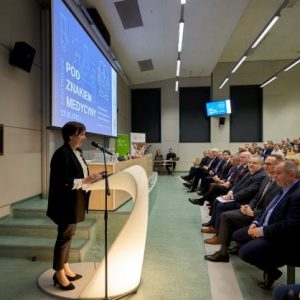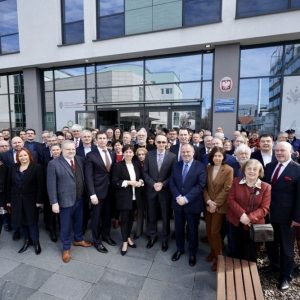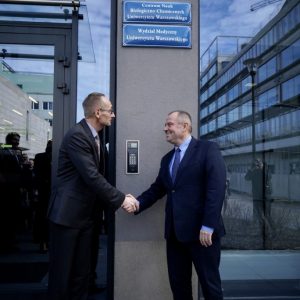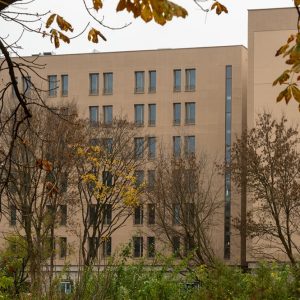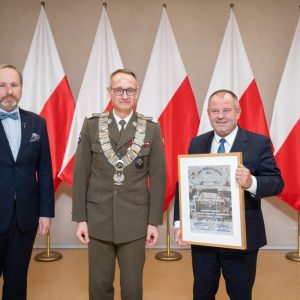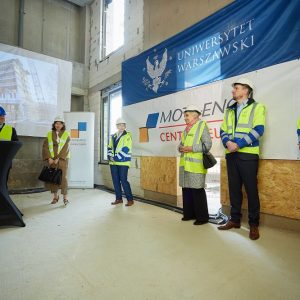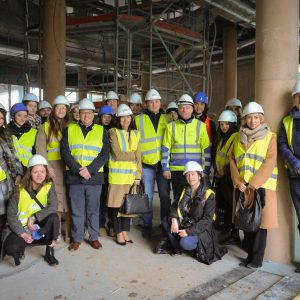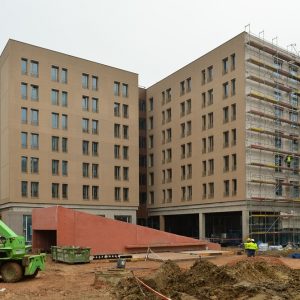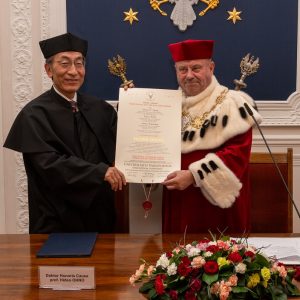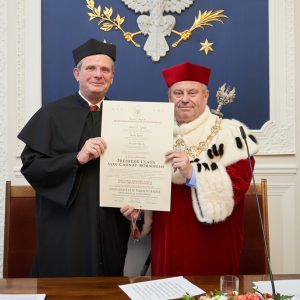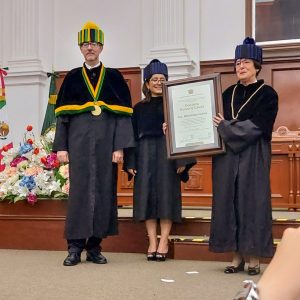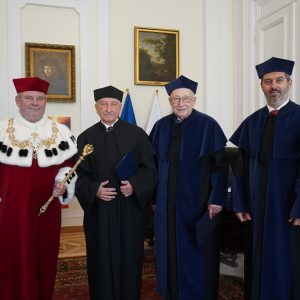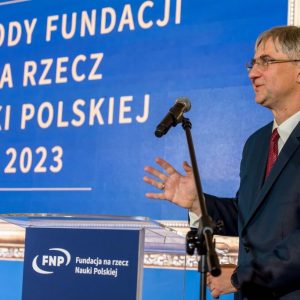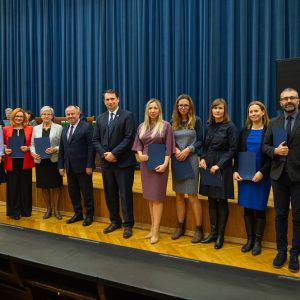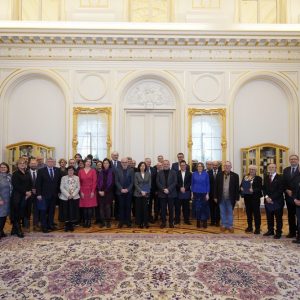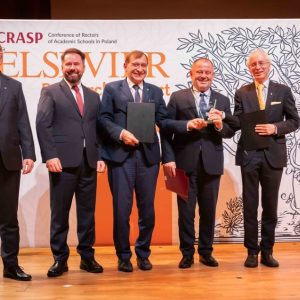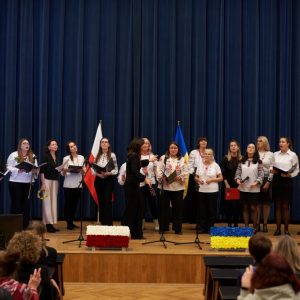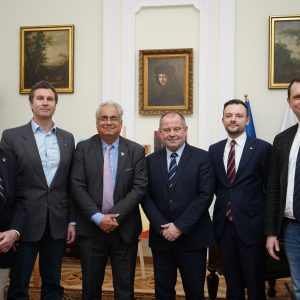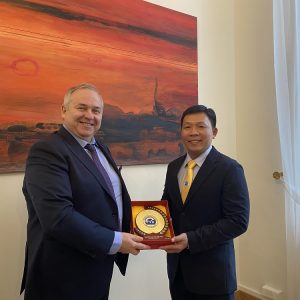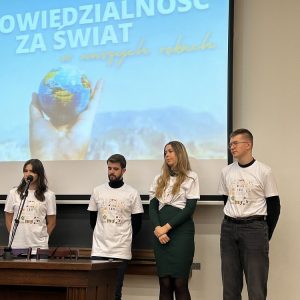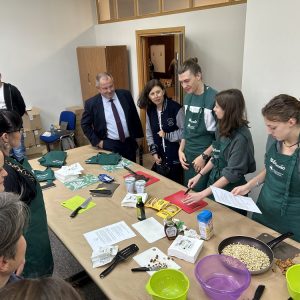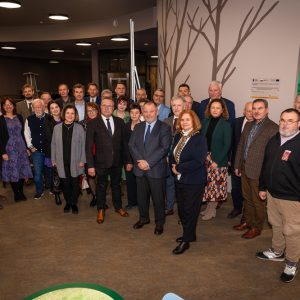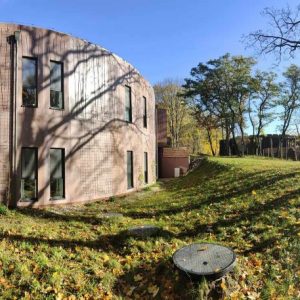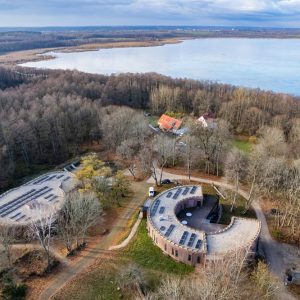Medical teaching returned to the University of Warsaw after more than 70 years. The construction work at the site of a new hall of residence in Służew is nearly completed and the University’s strategy for the next decade has been adopted. The last twelve months at the University of Warsaw were the time of various important events, innovative discoveries and awards granted to the members of the academic community.
Medicine back to the UW
After more than seventy years, the medical education at the University of Warsaw was resumed. On 10th January, Prof. Alojzy Z. Nowak, the UW Rector, submitted an application for establishing and commencing a full-cycle academic programme in medicine at the University of Warsaw in 2023/2024 academic year to the Ministry of Education and Science.
On the same day, an agreement was signed between the UW and the Southern Hospital in Warsaw on teaching and research cooperation in regard to the medical education at the University of Warsaw. On 17th March, the representatives of the University of Warsaw and the Military Institute of Medicine – National Research Institute took part in a series of lectures and scientific meetings titled “Under the sign: Medicine”, which was accompanied by the unveiling of a new plate of the Faculty of Medicine. The application filed in January was accepted by the Minister of Health on 22nd May and the Polish Accreditation Committee on 29th June. Finally, on 11th July, the Minister of Education and Science approved the establishing of the Faculty of Medicine at the University of Warsaw. The first students of medicine began their studies on 1st October.
New hall of residence
The Hall of Residence No. 7 with over 380 places for students and doctoral candidates is being built between Sulimy and Puławska streets. The investment is carried out as part of the Multiannual Plan. On 18th April, a topping out ceremony was held at the construction site on Służewiec Campus, signifying the installation of the final piece of the structure. The first tenants are scheduled to move into the hall in the second half of 2024.
Strategy for 2023–2032
On 29th June, the Senate of the University of Warsaw adopted the UW Strategy for 2023–2032. The document is the result of extensive consultation with academic community. It contains development objectives regarding teaching, research, management and work environment. They are embedded in the four pillars of the University’s activities (comprehensive teaching, research excellence, responsible university management and infrastructure development, friendly and activating working environment) and have been arranged according to the most important contexts arising from the current challenges and opportunities that the University is expected to face, including social impact, responsibility and internal processes, digitalisation, community building and internationalisation.
Eight ERC grants
European Research Council (ERC) grants are prestigious awards given to ground-breaking research in a chosen scientific area. In 2023, eight researchers from the UW received funding for the implementation of their projects. The laureates are Prof. Artur Obłuski from the UW’s Polish Centre of Mediterranean Archaeology (Consolidator Grant), Prof. Katarzyna Marciniak from the Faculty of „Artes Liberales” (Proof of Concept Grant), Prof. Piotr Skowron from the Faculty of Mathematics, Informatics and Mechanics, and Dr Agnieszka Brylak from the Faculty of Modern Languages (Starting Grant), Prof. Ewa Szczurek and Prof. Szymon Toruńczyk from the Faculty of Mathematics, Informatics and Mechanics, Prof. Paweł Caputa from the Faculty of Physics, and Prof. Magdalena Wojcieszak from the UW’s Centre of Excellence in Social Sciences (Consolidator Grant).
Findings and discoveries
The results of the projects carried out by UW researchers were presented in prestigious scientific journals, such as Nature or Science. Dr Przemysław Mróz from the UW’s Astronomical Observatory took part in the discovery of the two-faced star. Physicists from the University of Warsaw developed a new, highly efficient technique that makes quantum information transmission dozens of times faster. In Old Dongola the team of researchers led by Prof. Artur Obłuski from the Polish Centre of Mediterranean Archaeology (PCMA) discovered unique wall paintings of saints and King David, one of the last rulers of Christian Makuria. The archaeologists from the PCMA were also involved in the discovery of the mediaeval tattoo from Ghazali.
More information on the projects conducted by UW researchers can be found under the “Breakthroughs” tab.
Honoris causa of the UW
On 13th November, Prof. Hideo Ohno, a prominent condensed matter physicist from the University of Tohoku, received the doctor honoris causa title from the University of Warsaw. Also, on 5th December, an honorary doctorate of the UW was awarded to Prof. Freiherr Claus von Carnap-Bornheim, a researcher of the Roman period.
On 7th September, Prof. Mirosława Czerny from the Faculty of Geography and Regional Studies, a researcher of urban and regional phenomena and processes in Latin America, received an honorary doctorate from the Autonomous University of Mexico State in Toluca.
On 12th June, a ceremony was held at the UW to renew the doctorate of Prof. Michał Tymowski from the UW’s Faculty of History, an outstanding specialist in the mediaeval times and the history of pre-colonial Africa.
Prizes and awards for UW academics
On 15th November, six academic teachers were honoured with this year’s UW Rector’s Teaching Award. In addition, five academics received distinctions in their individual areas. The UW Rector also honoured 180 employees for their scientific activities, which particularly contributed to the development and prestige of the University.
On 11th December, forty-nine employees of the UW received the UW Rector’s Awards for their achievements in professional work.
Prof. Rafał Latała from the UW’s Faculty of Mathematics, Informatics and Mechanics received the Award of the Foundation for Polish Science (PL: Fundacja na rzecz Nauki Polskiej) in the area of mathematical, physical and engineering sciences. The Award Committee appreciated his contribution to proving Talagrand’s hypothesis on the Bernoulli process.
Awards for the UW
The University of Warsaw holds the first position among scientific institutions which are beneficiaries of the European Union’s Framework Programme – “Horizon Europe”. Researchers from the UW are involved in the implementation of sixty-six projects for a total amount of more than €26 million. To date, the European Union has awarded more than €419 million to grant recipients from Poland.
In October, the UW was awarded the Elsevier Research Impact Leaders Award 2023. The award is granted to universities whose research makes the greatest contribution to the perception of the Polish science worldwide. The UW won in the Natural Sciences category.
On 30th November, the University received a special award for its overall achievements in education in the “EDUInspirations” competition of the Foundation for the Development of the Education System.
Solidarity with Ukraine
In the lasting more than a year the “UW for Ukraine” programme, the University provided assistance to more than 8,000 people arriving in Poland from Ukraine after 24th February 2022. On 15th December, the initiatives, which involved almost thirty units of the University of Warsaw, were summarised during the closing conference.
Internationalisation
In 2023, the UW undertook and deepened cooperation with numerous foreign institutions, including Harvard University, Johannes Gutenberg University Mainz or Tra Vinh University in Vietnam.
The UW is developing research and teaching collaborations as part of the 4EU+ Alliance. In 2023, the University of Paris-Panthéon-Assas joined as a new member.
Green initiatives
Through more trees and green spaces, eco-friendly solutions in buildings, community fridges, Platform for Green Dialogue, Rector’s Team for Ecology and Climate Crisis, “Green Day”, dedicated programmes, projects and publications, the University of Warsaw undertakes numerous activities to protect the climate and nature. Below there are the most important initiatives.
In April, the UW hosted the fourth Climate Summit. This year, the University of Warsaw became a finalist in the world’s prestigious International Green Gown Awards 2023 competition.
The UW was awarded for the Green Thinking Matter Now! project – an initiative bringing together academics, students, business representatives, authorities and NGOs around the issues of climate change and sustainable development. On 20th October, the first “Green Day” was organised at the University.
New units
On 23rd November, the KUMAK Masurian Center for Biodiversity and Nature Education, operating at the UW’s Faculty of Biology, was officially opened. The KUMAK was established primarily to protect nature. Researchers from the UW argue that the key to protecting environment and biodiversity in the Mazury region is education – building ecological awareness and popularising knowledge about the natural world. The centre consists of two buildings designed on a circular plan. The first has an educational function – it houses an exhibition on the ecosystem of small water reservoirs. The second building has a didactic function – it holds laboratories and a seminar room with accommodation. It is mainly intended for educational and research purposes in the broad field of environmental science.
In addition to the KUMAK, the Centre for Comparative Research on Eastern and Western Philosophy at the UW was opened. The Polish Centre for Olympic Studies and Research, a joint venture between the UW and the Polish Olympic Committee, was also inaugurated.




